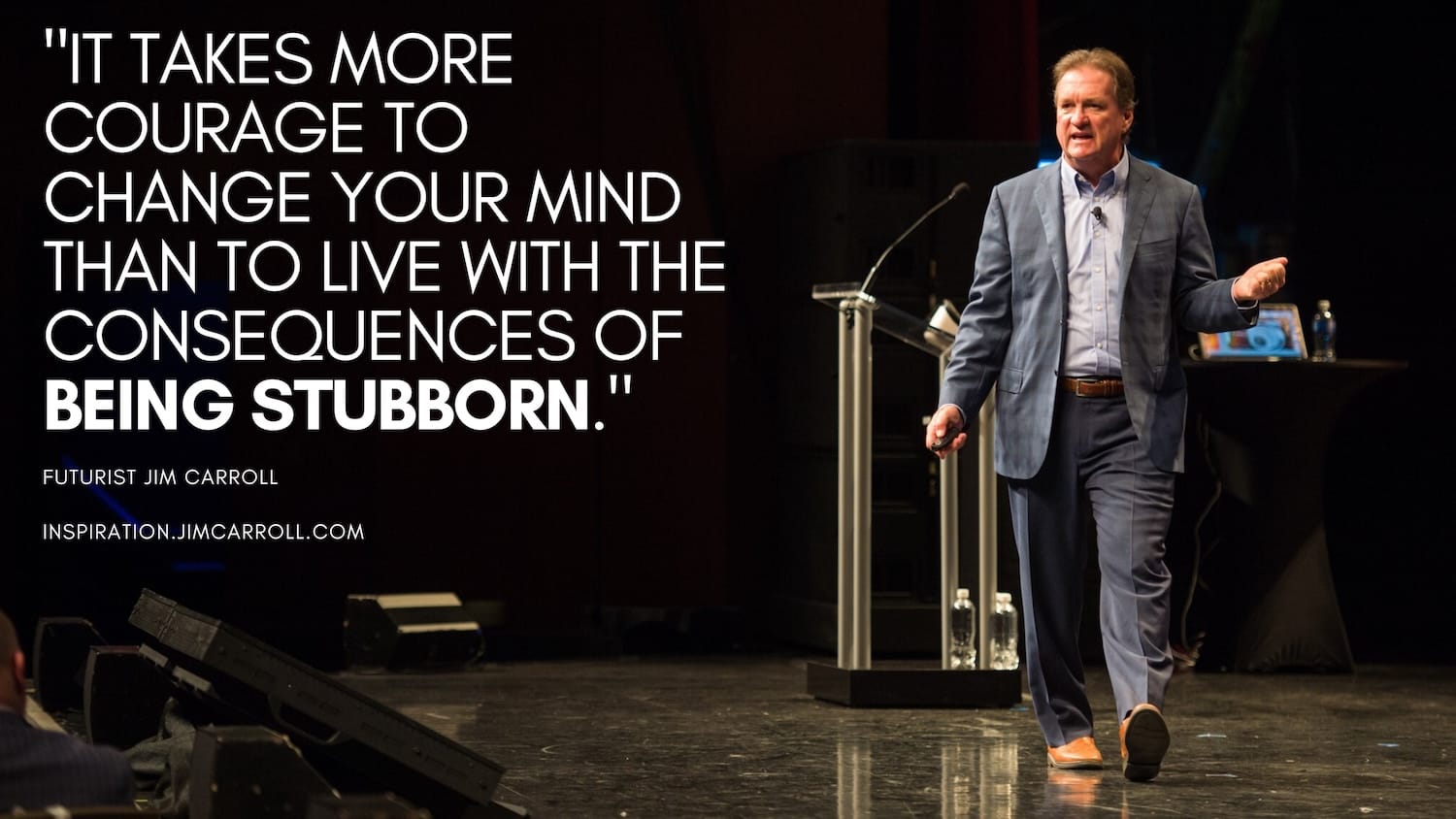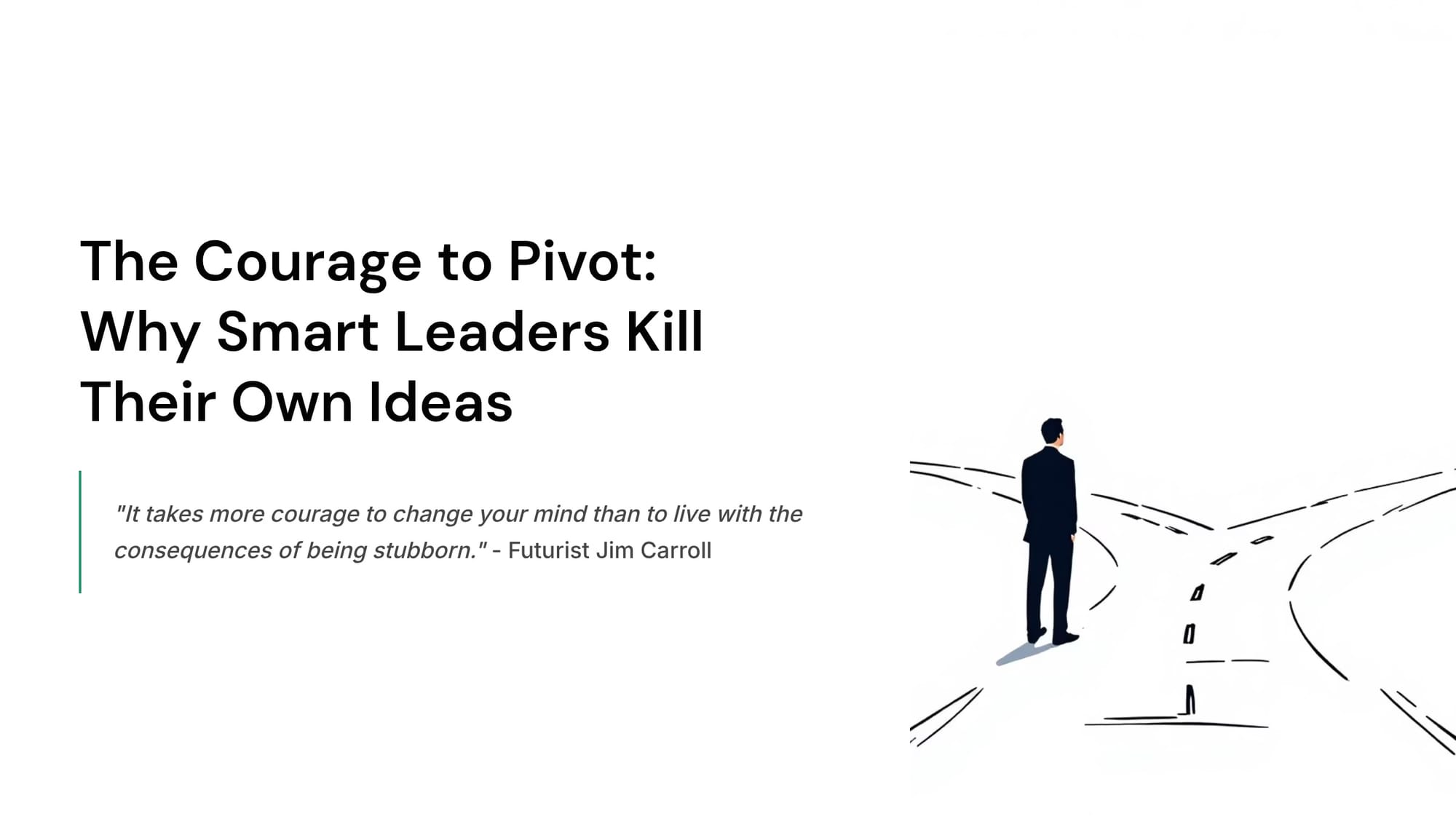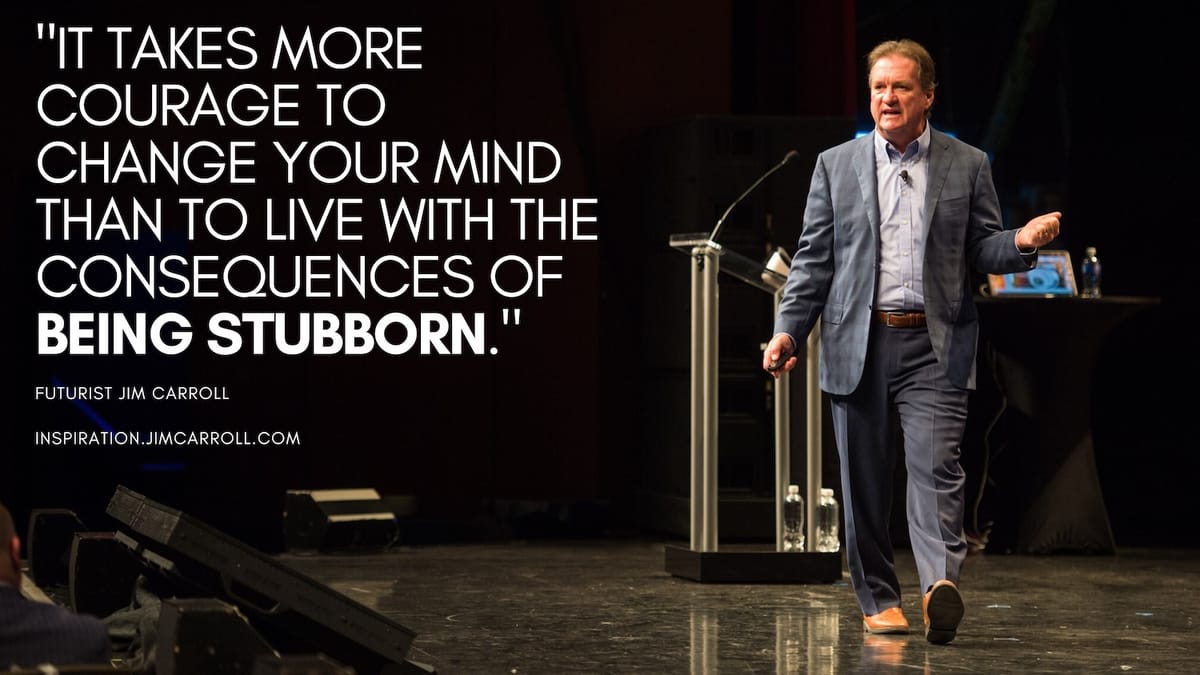"It takes more courage to change your mind than to live with the consequences of being stubborn." - Futurist Jim Carroll

Why is it that so many smart people kill their own ideas?
Stubbornness.
That's often the culprit.
I was speaking with a potential client the other day about an upcoming event; they were bemoaning the state of innovation inaction in the organization. He was suggesting that too many people were set in their ways, and I remember making this observation: "It takes more courage to change your mind than to live with the consequences of being stubborn."
I immediately wrote it down - it hit me like a lightning bolt. In thirty years of watching companies rise and fall, I've seen this truth play out countless times. The graveyard of business history is littered with organizations that had all the right instincts initially but lacked the courage to change direction when the market demanded it.
Here's what fascinates me about innovation: the very conviction that drives breakthrough thinking can become its greatest enemy. I've watched brilliant entrepreneurs pour years into products nobody wanted, simply because they couldn't summon the courage to admit their original vision was flawed.
Over the last few weeks, I've been helping one of my sons and his wife prep their new home for their move-in. I've been assigned the glorious task of doing the 'dump runs' - taking loads of old carpet, flooring, and other junk to the municipal landfill site. And every day that I do that, I drive past the Lazaridis School of Business and Economics at the University of Waterloo - they're close by. I've also gone past the Perimeter Institute for Theoretical Physics, established by Jim Balsillie. He also helped to establish the Balsillie Executive Institute - Professional Development at the University.
This is what happens when you donate a lot of money to your alma mater.
In any event, given the abject ultimate failure that was their company, Research in Motion (of Blackberry Fame), I wonder what one might learn at such institutions. A degree in the Master's of Stubbornness?. A Master of Doubling Down When Wrong? A PhD in Ignoring Market Signals or a Certificate in Advanced Denial Management? Or how about a Strategic Vision Impairment Certification or an Executive MBA in Dismissing Disruptive Technology?
Think about it. They revolutionized mobile communication with the Blackberry, once the most popular mobile device in the world, but when touchscreens emerged, they stubbornly clung to physical keyboards. Their engineering prowess became their prison. Meanwhile, Apple dared to cannibalize its own iPod business to create the iPhone.
This isn't just about technology companies. I've consulted with manufacturers who continued optimizing assembly lines while 3D printing was reshaping their entire industry. Retailers who perfected in-store experiences while e-commerce was eating their lunch. Media companies that doubled down on print while their audiences migrated to digital platforms.
I call it the "stubborn tax" - the compounding cost of refusing to adapt. In slow-moving industries, you might pay this tax gradually over decades. But in our hyper-accelerated world, the stubborn tax comes due much faster.
Consider the pace of change we're experiencing:
- Artificial intelligence capabilities are doubling every few months
- Consumer preferences are shifting overnight due to viral trends
- Regulatory landscapes evolving in real-time
- Supply chains are being rewritten by geopolitical events
In this environment, the half-life of any strategic decision is shrinking rapidly. What seemed like visionary thinking six months ago might be completely obsolete today.
Here's what I know: the companies that survive and thrive aren't necessarily the ones with the best initial ideas. They're the ones with the best adaptation mechanisms. The ones who can shift.The ones who adapt. Those who refuse to cling to yesterday like drowning people cling to a life preserver.
When it comes right down to the idea of innovation, you need to think about what I call the "pivot paradox": the more successful your current approach, the harder it becomes to change course. Success breeds organizational momentum, stakeholder expectations, and psychological attachment to "what got us here." It takes a lot of courage to break away from that, because stubbornness kicks in.
So how do we build organizations capable of this kind of intellectual courage? From my research, the most adaptive companies share several characteristics:
- They institutionalize dissent. Amazon's "disagree and commit" principle. Netflix's culture of "keeper test" thinking. These aren't just slogans - they're operational frameworks that make it safe to challenge prevailing wisdom.
- They treat strategies as hypotheses. Instead of five-year plans set in stone, they create testing frameworks. Every major initiative includes clear success metrics and exit criteria. When evidence contradicts assumptions, they pivot quickly rather than hoping for a turnaround.
- They celebrate intelligent failures. Google's "fail fast, fail cheap" mentality. 3M's tolerance for productive mistakes. They understand that in a rapidly changing world, the biggest risk is not taking enough risks.
- They separate ego from outcome. The best leaders I've worked with are ruthlessly objective about results. They can kill their pet projects without feeling personal defeat because they've learned to measure success by adaptation speed, not initial accuracy.
As we move deeper into what I call the "acceleration economy," this principle becomes even more critical. The organizations that will thrive in the coming decades won't be the ones with the best predictions - they'll be the ones with the best responses to surprises. And there are a lot of surprises coming our way. We're entering an era where artificial intelligence can generate thousands of potential solutions in seconds, where market conditions can shift overnight due to viral social media trends, and where breakthrough technologies can emerge from unexpected corners of the world.
In this environment, stubborn adherence to any single strategy isn't just costly - it's existential. The courage to change your mind isn't just a nice-to-have leadership trait; it's becoming the fundamental skill for organizational survival.
That's why you need to do a 'courage audit.' Look at your current strategic initiatives and ask yourself:
- What evidence would convince us to pivot?
- How quickly could we change direction if needed?
- What assumptions are we not testing?
- Where might we be paying the stubborn tax right now?
Do you want to challenge your team on their stubborn mindset? Take this PDF and share it around - it summarizes this post.

Remember: in a world of exponential change, the ability to change course isn't a sign of weakness or inconsistency.
It's the ultimate competitive advantage.
The future belongs to those with the courage to continuously reinvent it.
Futurist Jim Carroll has met a lot of stubborn people in his time - it comes with his focus on innovation.

